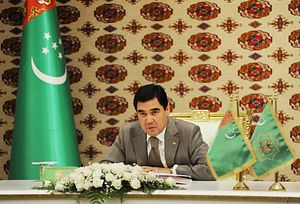The people of Turkmenistan love their President, Gurbanguly Berdimuhamedov, so much they urged him to build a monument to himself–a golden Berdimuhamedov riding a horse atop a marble pedestal now stands in Ashgabat. They also, apparently, may want him to be president for life.
In remarks televised on May 29, the speaker of parliament Akja Nurberdiyeva announced that the constitutional commission is considering two proposals: one to remove the age limit which bars those over 70 from being elected president, and a second that would extend the presidential term from five to seven years. These two changes pave the way for Berdimuhamedov to become president for life (not that it had ever been in doubt), like his predecessor. In the same broadcast, Berdimuhamedov himself said that provisions should also be made for who would take over should the serving president die in office (a question many wish Kazakhstan, with a much older serving president, would answer). Berdimuhamedov said the speaker of parliament would.
There’s an irony none should miss. When the country’s first president, Saparmurat Niyazov, died in 2006, the then-speaker of parliament, Ovezgeldy Atayev, was dismissed and quickly arrested. Berdimuhamedov, a deputy prime minister at the time, was hustled into power and hasn’t looked back since. Niyazov had been declared president for life in 1999.
Eurasianet says that the current constitution allows for Berdimuhamedov to run for three more five-year terms (for a total of five terms). The next election was scheduled for 2017, but could be pushed back to 2019 if the constitutional changes are enacted. Turkmenistan has never held an election judged free or fair by the international community. Berdimuhamedov was elected in 2007 with 89 percent, and again in 2012 with 97 percent of the vote.
Of the five Central Asian states, only Turkmenistan and Kyrgyzstan have had power change hands–but always through death or revolution. needless to say, their leaders are noticeably younger. Berdimuhamedov is 57 and Kyrgyz President Almazbek Atambayev is 58. Meanwhile, in Kazakhstan, Tajikistan and Uzbekistan, Soviet-era rulers remain in power–and would claim they do so legally: it’s all in the constitution after all.
What kings of old justified with divine right, modern leaders in Central Asia justify with constitutions that are constantly morphing to fit the needs, not of the people as intended, but of the rulers themselves.
Take Uzbekistan for example. In April, I wrote about the reelection of Uzbekistan’s President Islam Karimov. Karimov “has sustained a staged version of democracy through a series of strategic constitutional changes and referendums.” A brief outline of the legal hijinks:
In 1990, Karimov first came into office as president of the Uzbek Soviet Socialist Republic. He then won handily Uzbekistan’s first election as an independent country in 1991. In 1996 he extended his term via referendum and was reelected in 2000 to a seven-year term. He delayed the 2007 election by a technicality until December, and then won despite a two-term limit in the country’s constitution. The argument then was that his 1991 election did not count as one of his two “consecutive terms” because it was before the current constitution was put in place in 1992.
The trouble is that Central Asian leaders then make the case, internationally, that their societies are becoming more democratic, that they are governed by the will of the people and the writ of the law. It’s a refrain repeated ad nauseum by the region’s autocrats that their popularity with the people is why they continue to rule.
It’s easy to be popular when you hunt down, arrest, disrupt, and hide all dissent and opposition.

































